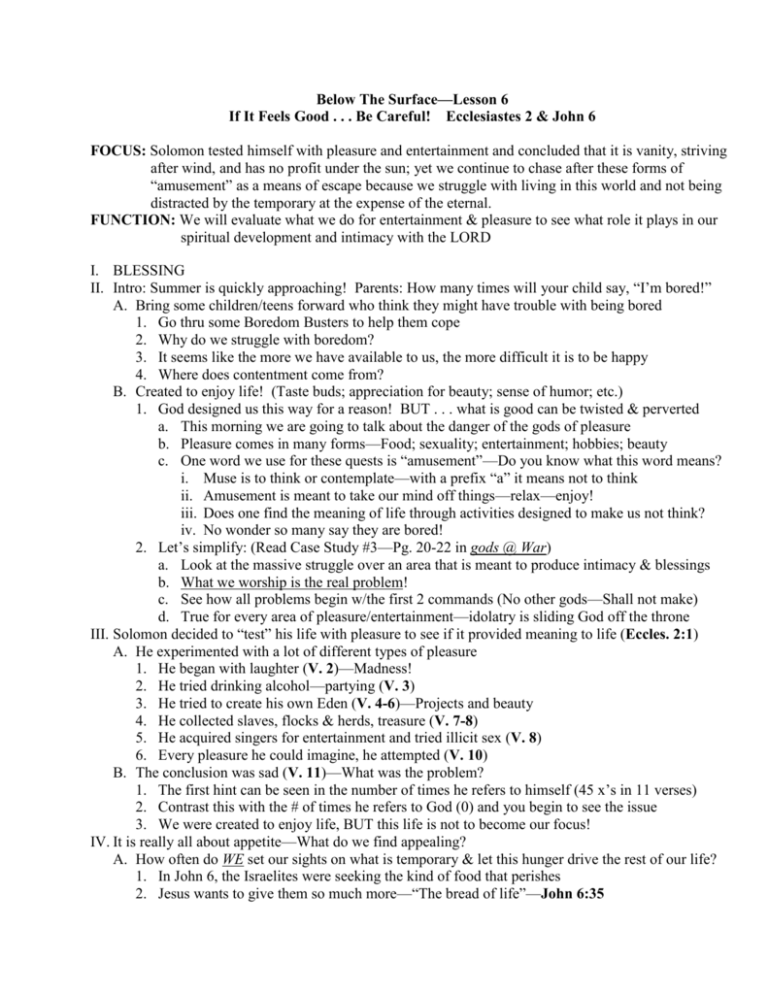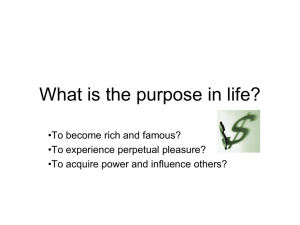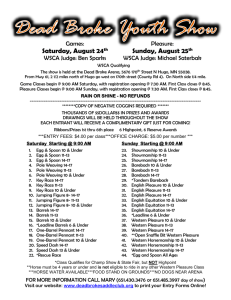If It Feels Good_BeCareful - Who Are You Below The Surface
advertisement

Below The Surface—Lesson 6 If It Feels Good . . . Be Careful! Ecclesiastes 2 & John 6 FOCUS: Solomon tested himself with pleasure and entertainment and concluded that it is vanity, striving after wind, and has no profit under the sun; yet we continue to chase after these forms of “amusement” as a means of escape because we struggle with living in this world and not being distracted by the temporary at the expense of the eternal. FUNCTION: We will evaluate what we do for entertainment & pleasure to see what role it plays in our spiritual development and intimacy with the LORD I. BLESSING II. Intro: Summer is quickly approaching! Parents: How many times will your child say, “I’m bored!” A. Bring some children/teens forward who think they might have trouble with being bored 1. Go thru some Boredom Busters to help them cope 2. Why do we struggle with boredom? 3. It seems like the more we have available to us, the more difficult it is to be happy 4. Where does contentment come from? B. Created to enjoy life! (Taste buds; appreciation for beauty; sense of humor; etc.) 1. God designed us this way for a reason! BUT . . . what is good can be twisted & perverted a. This morning we are going to talk about the danger of the gods of pleasure b. Pleasure comes in many forms—Food; sexuality; entertainment; hobbies; beauty c. One word we use for these quests is “amusement”—Do you know what this word means? i. Muse is to think or contemplate—with a prefix “a” it means not to think ii. Amusement is meant to take our mind off things—relax—enjoy! iii. Does one find the meaning of life through activities designed to make us not think? iv. No wonder so many say they are bored! 2. Let’s simplify: (Read Case Study #3—Pg. 20-22 in gods @ War) a. Look at the massive struggle over an area that is meant to produce intimacy & blessings b. What we worship is the real problem! c. See how all problems begin w/the first 2 commands (No other gods—Shall not make) d. True for every area of pleasure/entertainment—idolatry is sliding God off the throne III. Solomon decided to “test” his life with pleasure to see if it provided meaning to life (Eccles. 2:1) A. He experimented with a lot of different types of pleasure 1. He began with laughter (V. 2)—Madness! 2. He tried drinking alcohol—partying (V. 3) 3. He tried to create his own Eden (V. 4-6)—Projects and beauty 4. He collected slaves, flocks & herds, treasure (V. 7-8) 5. He acquired singers for entertainment and tried illicit sex (V. 8) 6. Every pleasure he could imagine, he attempted (V. 10) B. The conclusion was sad (V. 11)—What was the problem? 1. The first hint can be seen in the number of times he refers to himself (45 x’s in 11 verses) 2. Contrast this with the # of times he refers to God (0) and you begin to see the issue 3. We were created to enjoy life, BUT this life is not to become our focus! IV. It is really all about appetite—What do we find appealing? A. How often do WE set our sights on what is temporary & let this hunger drive the rest of our life? 1. In John 6, the Israelites were seeking the kind of food that perishes 2. Jesus wants to give them so much more—“The bread of life”—John 6:35 a. He just fed the 5000 and they wanted to force Him to be king b. They connect what Jesus did with God providing manna—He takes care of their needs! c. Missing the point! 3. The manna was appropriately named (“what is it?”) because they did not understand a. The manna was not really about the bread—it was about being obedient to God i. Deut 8:2-3—A test to see if they would learn man doesn’t live on bread alone ii. When it was given, people tried to save it overnight & went out on the Sabbath iii. The bread was about more than just filling their bellies! Same here!!! b. Do we recognize our need for the bread of life? i. Not a problem in the wilderness—their hunger & its availability led to seeking it ii. So much junk food in our culture we think we can be satisfied without Jesus iii. Think back to another food issue—Esau and the red stew iv. Esau was willing to trade what lasts for what does not! v. This limited perspective is what Jesus is trying to help these followers avoid c. It was about relationship with God—A walk with Him, trusting Him i. Do our choices, even our quests for pleasure, draw us nearer to Him? ii. Unfortunately, in John 6:66 most quit walking with Jesus iii. They don’t understand or appreciate what Jesus is offering V. INVITATION DISCUSSION QUESTIONS: 1. In what ways have you seen God provide “manna” in your life? How have you tried to accumulate or hoard His provision, rather than trusting Him to provide what you need each day? 2. On a scale of 1-10, what would you say your level of contentment is this week? What gets in the way of your contentment? How can you grow in contentment? 3. Do you agree or disagree with the following statement: The more we have available to us, the more difficult it is to be happy? How often do you feel bored? How do things of “amusement” bring on more boredom? 4. How much time a week do you spend watching TV; playing video games; on Facebook or other social media; involved with sports teams? Discuss whether you have a healthy balance in your life of these kinds of things with other pursuits like family and spiritual matters. 5. What do you think of Solomon’s concluding remarks in Ecclesiastes 2:11 concerning his experiment with pleasure and entertainment? How does an “under the sun” mentality set us up for diminishing returns in the areas of entertainment and pleasure? Is a walk with God and a focus upon eternity really better? In what practical ways is this better? What should we learn from the fact that all who ate the manna in the wilderness died? How much time do you spend on making sure your belly is full versus making sure your soul is full?









